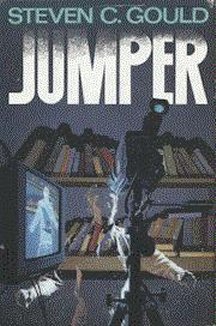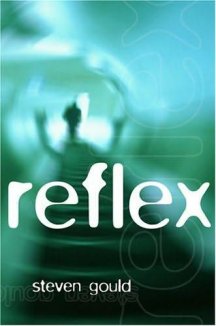

|
Looking Back At Jumper, Forward to Reflex
|
|
Davy Rice is a natural teleport. By an act of simple will he can "jump" to places he's been before. Davy first learns about his talent when his drunk and abusive father is about to beat him and he jumps to the cool, shadowy halls of the local public library, the one place where he feels safe. |

|
Steven Gould's debut novel, Jumper (New York: Tor, 1992) opens as a deceptively simple teenager-with-super-powers story, a precursor in many ways to the very successful TV series Smallville.

A long-term victim of physical and emotional abuse, Davy uses his power to run from his problems, only to learn that his past will inevitably catch up to him. Briefly reunited with his mother (who, in escaping from her abusive husband, also abandoned her son), Davy is devastated when she is murdered by terrorists. Refusing to dwell in the role of victim, Davy uses his power to hunt down his mother's killers and avenge her death in classic fantasy style.
Jumper is a no-nonsense coming-of-age fantasy adventure with an interesting array of earth-bound plot elements - a developing love affair with a woman Davy feels compelled to lie to, a bank robbery, a suspicious police detective, and government agents who will go to any lengths to recruit him. Davy Rice is a likeable and well-drawn character, and his sympathetically human struggle to deal with the tragedies in his life engages readers and nicely counterbalances the more fantastical plot elements. Often compared favorably to the best of Robert Heinlein's juveniles, Jumper, marked by a sometimes brutal honesty, has earned a spot on the top 100 most challenged books list of 1990 to 1999. Of course, the list also includes authors Maya Angelou, J.D. Salinger, Mark Twain, John Steinbeck, Harper Lee, Kurt Vonnegut, Maurice Sendak and Madeleine L'Engle - not altogether bad company, and a major flashpoint.
The many fans of Jumper have waited twelve long years for a sequel, and in December, 2004 their patience will be rewarded. Reflex (New York: Tor, Dec 2004) resumes a decade later.

Davy and Millie are married, and Davy has entered into a working arrangement with the National Security Agency. Drugged and kidnapped by a mysterious and obviously powerful organization, Davy is subjected to a program of brainwashing and behavioral conditioning (hence the title, Reflex) calculated to make him a willing tool. But a second teleport has emerged, and the secret of this jumper's origin will change all the rules of the game.
Murder, kidnapping, torture, terrorism, experimentation in forbidden human medical research notwithstanding, there is still one line that Davy's captors won't cross - imprisoning a man in solitary confinement without a book to read. Yes, even the bad guys have a sense of humor, for the book they provide is none other than Alexandre Dumas' The Count of Monte Cristo. The inclusion of this book is in part an acknowledgement of the granddaddy of SF teleportation stories, Alfred Bester's The Stars My Destination (originally Tiger! Tiger!), another revenge story which has often been compared to The Count of Monte Cristo. In Jumper, there is a rather subtle play made upon this not-so-subtle reference. Dumas's novel is really two stories: the escape of Edmond Dantes from the impregnable Chateau d'If and the revenge he exacts on his enemies. Gould neatly inverts this: Jumper is a tale of revenge; its sequel, Reflex, a story of an improbable escape.
A major device in the Chateu d'If portion of Dantes' story is a secret tunnel linking his cell with that of fellow prisoner Abbe Faria. This tunnel is the key to Dantes' salvation; it provides precious human contact and is instrumental in enabling Dantes to maintain his sanity throughout fourteen years of imprisonment. Further, it is Faria's dying bequest - revealing the location of a fabulous treasure on the island of Monte Cristo - plus a grisly subterfuge that leads to Dantes' escape and his subsequent transformation into the avenging Count. How interesting then that in Reflex Gould depicts the process of jumping as one of opening a hole ("a Davy-sized hole") that stretches between two points in space, much like a tunnel. Not to give too much away - the tunnel-like aspect of teleporting is a major plot development in the last half of the book.
In Reflex, Gould further inverts Dumas' story line. Instead of the inescapable prison, we now have the un-cage-able man. When four walls do not a prison make, how do you imprison a man who can teleport at will? More importantly, how do you bend that man's will to make it serve your own purpose?
Reflex exudes the same down-to-earth warmth and charm of Jumper, but Gould is clearly a more polished writer now. The story hums along at a fast pace, and plot developments are well timed and smartly executed. Indeed, if I had to pick one word to describe Gould's writing, it would be "smart." And that's just how you'll feel about deciding to invest the time to read Steven Gould's newest book.
Questions or comments?
| Forum
| Store
| Publications
| BookLinks
| BookSearch
| BookTopics
| Archives
| Advertise
| AboutUs
| ContactUs
| Search Site
| Site Map
| Google Site Map
Store - Specials
| BookHunt
| BookShelf
| Gold Edition & BookThink's Quarterly Market Report
| DomainsForSale
| BookThinker newsletter - free
Copyright 2003-2011 by BookThink LLC
Contact the editor, Craig Stark
editor@bookthink.com
